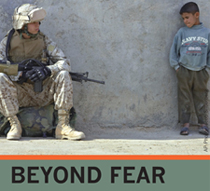Elementary School #2 in
Tadjoura feels like a very happy place... despite the dusty, sandy grounds, the spartan buildings, and the deep poverty.

The classes, conducted in French, are full of smiling children. There is a computer lab here for training teachers in the region. The equipment came from the U.S. Agency for International Development (
USAID).

The lunch room was gutted and renovated by the U.S. military.

And the storeroom contains bags of food donated by the United States, Saudi Arabia, and the World Food Programme.

We've learned a lot in the last few days about the
military's development efforts here in the Horn of Africa. So it was nice to spend this day visiting a school and health clinic with
USAID's country coordinator for Djibouti, Janet
Schulman.
One of the most controversial areas I want to examine on this trip is the good and bad of having the U.S. military engaged in development and diplomacy work normally associated with agencies like the State Department and
USAID. The military clearly has the resources and command structure to make a lot of things happen on the ground... and fast.
Some worry, however, that the new roles could degrade the
military's traditional defense capabilities.
Others are afraid the
military's new efforts will lack cultural context and sensitivity and won't be integrated with other parts of U.S. and international development efforts.
But Janet
Schulman has nothing but good things to say about what the Combined Joint Task Force-Horn of Africa is doing in Djibouti.
"The military has
always had a civilian affairs unit. And rather than have them roaming around the country willy-
nilly, constructing things that may or may not be useful and may or may not be a priority for the community, I think us [military and
USAID] coming together, planning together, and executing projects together is to the benefit of all," she said.
 Schulman
Schulman adds, "They [the
Djiboutians] are growing to trust Americans."
--Keith Porter























